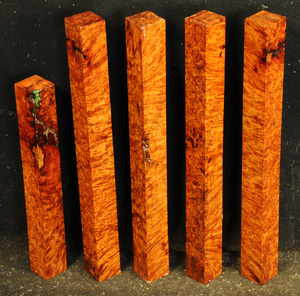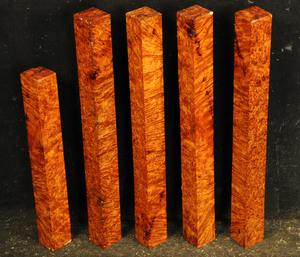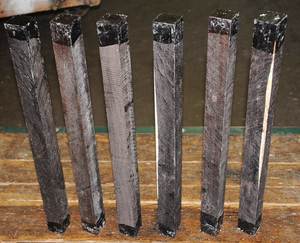Amboyna Burl Turning Squares/Pool Cue Blanks
Pterocarpus indicus
One of the world's most rare and beautiful burls. A light to deep reddish-orange, sometimes with darker lines, and with a lovely, spicy scent, there is hardly an area not highly figured with bird's-eyes. Hard & heavy and capable of taking a fine polish.
A is only tallied at 9" long due to some defects at one end.
B is only tallied at 14 1/4" due to a defects at one end.
Item Number: W43471
New Guinea Striped Ebony Turning Squares/Pool Cue Blanks
Diospyros insularis
This wood originated from a small, sparsely inhabited island off the east coast of New Guinea. Some of these trees grow to enormous dimensions. One of the first logs we received from here was 3 1/2 feet in diameter, 18 feet long, and weighed 7 tons. It is fine-grained and takes a glassy smooth finish. Most of these pieces have a "marble-cake" look to the end grain that is outstanding.
Item Number: W42722
New Guinea Striped Ebony Turning Squares/Pool Cue Blanks
Diospyros insularis
This wood originated from a small, sparsely inhabited island off the east coast of New Guinea. Some of these trees grow to enormous dimensions. One of the first logs we received from here was 3 1/2 feet in diameter, 18 feet long, and weighed 7 tons. It is fine-grained and takes a glassy smooth finish. Most of these pieces have a "marble-cake" look to the end grain that is outstanding.
Item Number: W42721
Brazilian Bloodwood Turning Squares
Brosimum paraense
Also called Satine, Cacique, and Cardinalwood. The heartwood is a rich strawberry red, in sharp contrast to the light colored sapwood. Takes a high, lustrous finish.
Item Number: W42497
Brazilian Bloodwood Turning Squares/Pool Cue Blanks
Brosimum paraense
Also called Satine, Cacique, and Cardinalwood. The heartwood is a rich strawberry red, in sharp contrast to the light colored sapwood. Takes a high, lustrous finish.
Item Number: W42496
Figured Narra Turning Squares/Pool Cue Blanks
Pterocarpus indicus
Also called New Guinea Rosewood. It is a beautiful, highly lustrous golden yellow color sometimes with reddish streaks. A nice turning wood it is also used in furniture, jewelry boxes, handles, etc. It is easy to work and glue and takes a nice polish.
Item Number: W42370
Figured Hard Maple Turning Squares/Pool Cue Blanks
Acer saccharum
The heartwood is white or cream to light brown or reddish brown. Because of the generally small size of available logs, most sawmills produce flatsawn boards which will show a broken curl on the surface and a fiddleback curl on the quartersawn edge. Hard and heavy, 45 lbs/cu ft. Easy to work and takes a smooth polish. U.S.A.
Item Number: W42156
Pomelle Bubinga Cane Blanks/Pool Cue Blanks
Guibourtia tessmannii
Called by some woodworkers African Rosewood, Bubinga is a deep, lustrous, brownish-red color with a fine, darker striping. The figure makes the wood doubly beautiful. It is very hard and heavy and takes a glassy, smooth finish.
Due to CITES regulations, we can only ship this species to customers in the United States.
Pomelle is the rarest figure found in Bubinga.
A has some bug holes.
Item Number: W41911
Prima Vera Turning Squares/Pool Cue Blanks
Cybistax donnell-smithii
Also called Palo Blanco, this Mexican & Central American species is yellow-white in color with a medium texture. Almost always shows a ribbon-stripe figure on the radial surface. Very lustrous. Used for fine furniture and cabinetry, musical instruments, jewelry boxes, and turnery.
Item Number: W41870
West African Ebony Turning Squares
Diospyros crassiflora
Sometimes called Gabon or Gaboon, this Ebony is sometimes jet black but oftentimes has grayish streaks that mostly disappear when finished or after the made object has been put into service. This Ebony has a marked resistance to checking that is characteristic of some of the Indian and Asian species. It has a wonderful texture and is easily carved, planed, turned, and milled. It is fairly fine-grained and takes a high polish. This Ebony usually originates in either Cameroon or Nigeria and the logs are rough hewn in the forest and oftentimes brought to the nearest road by human porters. With the disappearance of other species of black Ebony this species is fast becoming the Ebony of choice.
Item Number: W41711
West African Ebony Turning Squares
Diospyros crassiflora
Sometimes called Gabon or Gaboon, this Ebony is sometimes jet black but oftentimes has grayish streaks that mostly disappear when finished or after the made object has been put into service. This Ebony has a marked resistance to checking that is characteristic of some of the Indian and Asian species. It has a wonderful texture and is easily carved, planed, turned, and milled. It is fairly fine-grained and takes a high polish. This Ebony usually originates in either Cameroon or Nigeria and the logs are rough hewn in the forest and oftentimes brought to the nearest road by human porters. With the disappearance of other species of black Ebony this species is fast becoming the Ebony of choice.
Item Number: W41709
European Sycamore Turning Squares
Acer pseudoplatanus
This European Maple is native to central Europe and west Asia. It is a tough, white or cream colored, fine-grained timber. It reminds me of vanilla ice cream because it is so even-colored. It works well in any grain direction. It is used for musical instruments, furniture, cabinetry, and because it is non-staining it is used for kitchen utensils, wooden spoons, rolling pins, and cutting boards. The figure is fiddleback on the quartersawn surface and more of a broken curl on the flatsawn surface. Select, quartersawn material is used for violin backs and sides and necks. Dry.
Item Number: W41022
Figured Afromosia Turning Squares/Pool Cue Blanks
Item Number: W40018
African Blackwood Turning Squares/Pool Cue Blanks
Dalbergia melanoxylon
The heartwood is purplish to brownish-black with dark gray streaks giving an overall impression of being black. Lustrous with an attractive inner chatoyance. Very hard, heavy, close-grained, and virtually free from pores. Slightly oily to the touch. The sapwood is straw colored to a bright yellow and can be as wide as 2". African Blackwood can weigh as much as 85 lbs per cubic foot. It is used for marquetry, inlays, knife handles, game calls, pistol grips, pool cue butts, chess pieces, jewelry, and other precious arts and crafts. But its main use is in turning, and it claims the title of the finest of turnery woods, well known as the standard by which other turnery woods are judged. Long a favorite of ornamental turners, the nature of the wood allows very fine detail with sharp cutters, leaving a beautiful, burnished surface. Its stability, oily nature, resistance to moisture, and lovely finishing qualities make it superior to other timbers. These are best quality squares. Rare.
Due to CITES regulations, we can only ship this species to customers in the United States.
Item Number: OS52





























